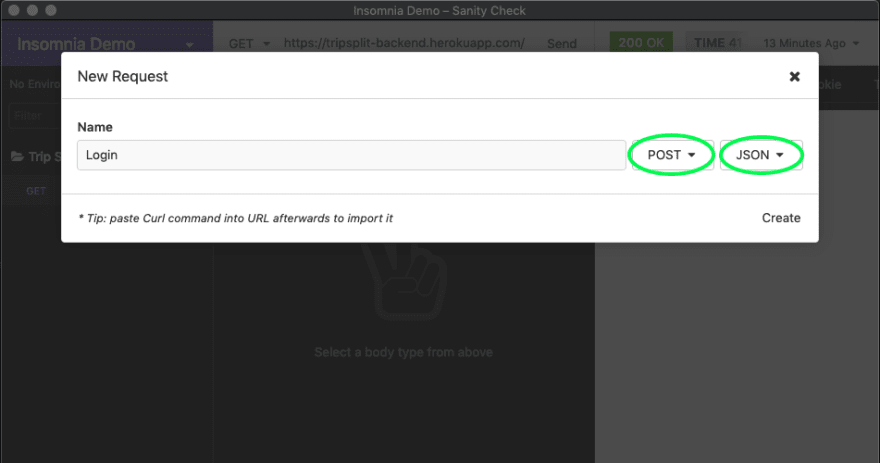
Waiting for a file descriptor to become ready. That specifies the interval that select() should block The timeout argument is a timeval structure (shown below) Indicated file descriptors in each set are checked, up to
#Insomnia api select all plus
Nfds This argument should be set to the highest-numbered fileĭescriptor in any of the three sets, plus 1. For examples of someĮxceptional conditions, see the discussion of POLLPRI inĪfter select() has returned, exceptfds will be cleared ofĪll file descriptors except for those for which an The file descriptors in this set are watched for However,Įven if a file descriptor indicates as writable, a largeĪfter select() has returned, writefds will be cleared of A file descriptor is readyįor writing if a write operation will not block. Particular, a file descriptor is also ready on end-of-Īfter select() has returned, readfds will be cleared ofĪll file descriptors except for those that are ready for A file descriptor is readyįor reading if a read operation will not block in The file descriptors in this set are watched to see if The arguments of select() are as follows: The file descriptor fd is present in set, and zero if it After calling select(), theįD_ISSET() macro can be used to test if a file descriptor Select() modifies the contents of the sets according to Is a no-op, and does not produce an error.

Removing a file descriptor that is not present in the set This macro removes the file descriptor fd from set. Adding aįile descriptor that is already present in the set is a This macro adds the file descriptor fd to set. It should be employed as the first step in initializing a This macro clears (removes all file descriptors from) set. The contents of a file descriptor set can be manipulated using Sets must be reinitialized before each call. Thus, if using select() within a loop, the Modified in place to indicate which file descriptors areĬurrently "ready". Note well: Upon return, each of the file descriptor sets is Specified as NULL if no file descriptors are to be watched for The principal arguments of select() are three "sets" of fileĭescriptors (declared with the type fd_set), which allow theĬaller to wait for three classes of events on the specified set A fileĭescriptor is considered ready if it is possible to perform aĬorresponding I/O operation (e.g., read(2), or a sufficiently Waiting until one or more of the file descriptors become "ready"įor some class of I/O operation (e.g., input possible).

Select() allows a program to monitor multiple file descriptors, Many modern applications-and this limitation will not change.Īll modern applications should instead use poll(2) or epoll(7),

SYNOPSIS top #include int select(int nfds, fd_set *restrict readfds, fd_set *restrict writefds, fd_set *restrict exceptfds, struct timeval *restrict timeout ) void FD_CLR(int fd, fd_set * set ) int FD_ISSET(int fd, fd_set * set ) void FD_SET(int fd, fd_set * set ) void FD_ZERO(fd_set * set ) int pselect(int nfds, fd_set *restrict readfds, fd_set *restrict writefds, fd_set *restrict exceptfds, const struct timespec *restrict timeout, const sigset_t *restrict sigmask ) įeature Test Macro Requirements for glibc (seeĭESCRIPTION top WARNING: select() can monitor only file descriptors numbers thatĪre less than FD_SETSIZE (1024)-an unreasonably low limit for Select, pselect, FD_CLR, FD_ISSET, FD_SET, FD_ZERO - synchronous
#Insomnia api select all manual
SELECT(2) Linux Programmer's Manual SELECT(2) NAME top


 0 kommentar(er)
0 kommentar(er)
